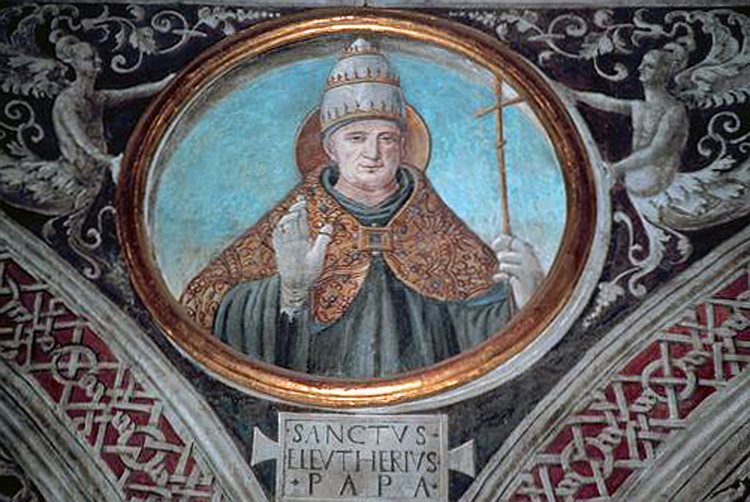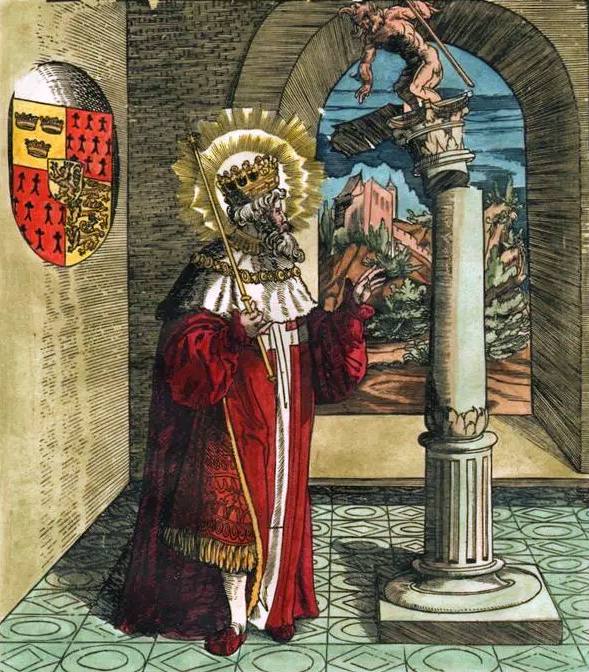
Adapted from Various Sources.
History is often divided into various epochs or ages, which often overlap. Thus in the history of the Church,
we may distinguish the Apostolic Age immediately following the Life of Our Lord Jesus Christ, and ending with death of St. John the
Evangelist. This was succeeded by the Age of Martyrdom; but in reality, the Age of Martyrdom began almost simultaneously with the
Apostolic Age, at the martyrdom of St. Stephen. And while martyrdoms yet continued, then came what we may call the Age of Evangelism –
a second apostolate, during which those parts of Europe which were still pagan, or under the influence of heresy or Islam,
were converted to the true Faith by zealous and saintly apostles.
We will repeat here a brief passage from the article on
Saints Cyril and Methodius in Issue No. 177:
To the sudden and splendid outburst of the good tidings, which marked the first centuries of the Christian era, had succeeded the labors of the second apostolate, to which the Holy Ghost entrusted the gathering in of those new nations called by Divine Wisdom to replace the ancient world. Already under that mysterious influence of the eternal city whereby she assimilated to herself even her conquerors, another Latin race had been formed out of those barbarians whose invasion seemed, like a deluge, to have submerged the whole empire (cf. St. Leo the Great). Scarcely was this marvellous transformation effected by the Baptism of the Franks (cf. St. Remigius), the conversion from Arianism of the Goths (cf. St. Isidore of Seville) and of their variously named brethren in arms, than the Anglo-Saxons, the Germans, and lastly the Scandinavians – conducted respectively by the three monks, St. Augustine of Canterbury, St. Boniface and St. Anscharius – came in turn to knock for admission at the gates of Holy Church. At the creative voice of these new apostles, Europe appeared, issuing from the waters of the sacred font.
Among these apostles, we number not only the priests and bishops who did the actual evangelizing, but also the Popes who sent them, the Abbots and Religious Founders who formed them, the holy kings and emperors who aided them, as well as the saintly converts whose example helped their work. Besides those mentioned above, we have already featured many of these apostles in past issues, including: St. Benedict; Pope St. Gregory the Great; St. Hermenegild; St. Leander of Seville; St. Patrick, Apostle of Ireland; and St. Stephen, King of Hungary.
We will begin this series with one the earliest of these apostles in the history of the Church, followed by the apostle who completed his work centuries later:

This day is honored by the memory of one of those early Pontiffs, who, like St. Urban, were the foundations of the Church
in the Age of Martyrdom. St. Eleutherius ascended the Papal throne in the very midst of the storm that was raised by Marcus Aurelius
and Commodus. It was he that received the embassy sent to Rome by the martyrs of Lyon; and at the head of them that were thus sent was
the great St. Irenaeus. This illustrious church, which was then so rich in martyrdom, would offer its palms to Christian Rome, in which,
to use St. Irenaeus' own expression, it recognized the highest sovereignty
(Adversus Haereses, lib. 3, cap. 3.)
Peace, however, was soon restored to the Church, and the remainder of St. Eleutherius' pontificate was undisturbed. In the enjoyment of this peace, and with his name, which signifies a freeman, this Pontiff is an image of Our Lord Jesus Christ, Who, as the Psalmist says of Him, is free among the dead (Ps. 87: 6). The Church honors St. Eleutherius as a martyr, as She does the other Popes who lived before Constantine, and of whom almost all shed their blood in the persecutions of the first three centuries. Sharing, as they did, in all the sufferings of the Church, governing it amidst perils of every description, and seldom or never knowing what peace was, these thirty-three Popes have every right to be considered as martyrs.
It is a special glory for St. Eleutherius that he was the Apostle of Britain. The Romans had made Britain one of their colonies, and thus brought the island into communication with the rest of the world. Divine Providence chose the peaceful years of St. Eleutherius as the time for uniting it to the Church, at least in some measure. This was in the second century. But later on, England was to become the Island of Saints; and this same day was the heavenly birthday of her second Apostle, St. Augustine of Canterbury. The Roman Breviary tells us:
 Saint Eleutherius was born at Nicopolis in Greece. He was a deacon of Pope Anicetus, and was chosen to govern the Church during
the reign of the Emperor Commodus. At the beginning of his pontificate, he received letters from Saint Lucius, King of the Britons
(image at left), begging him to receive himself and his subjects among the Christians. Wherefore Saint Eleutherius sent into
Britain Ss. Fugatius and Damian, two learned and holy men; through whose ministry the king and his people might receive the Faith.
It was also during his pontificate that Saint Irenaeus, a disciple of Saint Polycarp, went to Rome, and was kindly received by
St. Eleutherius. The Church of God was then enjoying great peace and calm, and the Faith made progress throughout the whole world,
but nowhere more than at Rome. Saint Eleutherius governed the Church fifteen years and twenty-three days. He thrice held ordinations
in December, at which he made twelve priests, eight deacons, and fifteen bishops for various places. He was buried in the Vatican,
near the body of Saint Peter.
Saint Eleutherius was born at Nicopolis in Greece. He was a deacon of Pope Anicetus, and was chosen to govern the Church during
the reign of the Emperor Commodus. At the beginning of his pontificate, he received letters from Saint Lucius, King of the Britons
(image at left), begging him to receive himself and his subjects among the Christians. Wherefore Saint Eleutherius sent into
Britain Ss. Fugatius and Damian, two learned and holy men; through whose ministry the king and his people might receive the Faith.
It was also during his pontificate that Saint Irenaeus, a disciple of Saint Polycarp, went to Rome, and was kindly received by
St. Eleutherius. The Church of God was then enjoying great peace and calm, and the Faith made progress throughout the whole world,
but nowhere more than at Rome. Saint Eleutherius governed the Church fifteen years and twenty-three days. He thrice held ordinations
in December, at which he made twelve priests, eight deacons, and fifteen bishops for various places. He was buried in the Vatican,
near the body of Saint Peter.
Thy name, O St. Eleutherius, is the name of every Christian that has risen with Christ. The Pasch has delivered us all, emancipated all, made us all freemen. Pray for us that we may ever preserve that glorious liberty of the children of God, of which the Apostle speaks (Rom. 8: 21). There is another kind of liberty of which the world boasts, and for the acquiring whereof it sets men at variance with men. It consists in avoiding as a crime all subjection and dependence, and in recognizing no authority except the one appointed by their own elections, which they can remove as soon as they please. Deliver us, O holy Pontiff, from this false liberty, which is so opposed to the Christian spirit of obedience, and is simply the triumph of human pride. In its frenzy, it sheds torrents of blood; and with its pompous chant of what it calls the rights of man, it substitutes egoism for duty. It acknowledges no such thing as truth, for it maintains that error has its sacred rights; it acknowledges no such thing as good, for it has given up all pretension to prevent evil. It puts God aside, for it refuses to recognize Him in those who govern. It puts upon man the yoke of brute force: it tyrannizes over him by what it calls a majority; and it answers every complaint that he may make against injustice by the jargon of accomplished facts. No, this is not the liberty into which we are called by Christ, our Deliverer. We are free, as St. Peter says, and yetmake not liberty a cloak for malice (1 Peter 2: 16).
O holy Pontiff! show thyself still a Father to the world. During thy peaceful reign thy throne was near to that of the Caesars, who governed the city of the Seven Hills. They were the rulers of the world, and yet thy name was revered in every part of their Empire. Whilst the material power held the sword suspended over thy head, the faithful of various distant lands were flocking to Rome, there to venerate the Tomb of St. Peter, and pay homage to thee, his successor. When the holy King Lucius sent ambassadors from his island, they turned not their steps to the Emperor's palace, but to thy humble dwelling. They came to tell thee that a people was called by divine grace to receive the Gospel, and become a portion of the Christian family. The destinies of this people, which thou wast the first to evangelize, were to be great in the Church. The Island of Britain is a daughter of the Roman Church; and the attempts she has made to disown her origin are useless. Have pity on her, O thou who wast her first Apostle! Remember the faith of St. Lucius and his people; and show thy paternal solicitude for a country which thou didst lead to the Faith.
NEW: Alphabetical Index
Contact us: smr@salvemariaregina.info
Visit also: www.marienfried.com